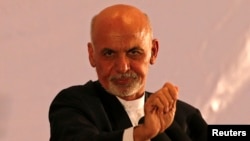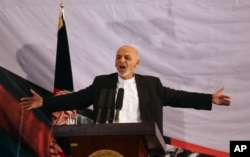This week Afghanistan ended months of bitter disputes over the country's presidential election with a widely-hailed U.S.-brokered power-sharing agreement. But the deal, which installs Ashraf Ghani as president and his rival Abdullah Abdullah as a newly created "chief executive," has critics who question whether it will be strong enough to tackle the country's many challenges just as international troops prepare to leave.
Afghanistan's elections started in April, went to a runoff round in June, and then spent months in limbo as accusations flew over vote rigging and the United Nations investigated.
The impasse ended earlier this week, when Ashraf Ghani and Abdullah Abdullah agreed on a power-sharing arrangement. The election commission has also decided to not disclose the number of votes each of the candidates received in the runoff election, a primary demand Abdullah had put forward before signing the deal with Ghani.
While the agreement has, for now, ended a deadlock that many saw as destabilizing for Afghanistan, critics say it was a setback for the country's fledgling democracy.
Naeem Ayubzada is the head of the Kabul-based Transparent Election Foundation of Afghanistan, which monitored the auditing process and deployed thousands of polling observers.
"The political agreement solved the current situations but undermined the credibility and all the achievements regarding the technical process. It hurt the [entire election] process, it hurt the transparency and it hurt the election principles," said Ayubzada.
In his victory speech Monday, President-elect Ghani promised to establish a strong merit-based unity government together with Abdullah that will be accountable to the people and will take responsibility for all of its decisions.
He also dismissed criticism of being the president of a "two-headed government."
Ayubzada is skeptical about those claims and fears the candidates' history of political bickering is likely to dominate their future actions.
"We do have concerns about the political crisis of Afghanistan because there are two bosses and the concern is that these two big players will be busy with their own things and will not focus on the people and will not focus on other developments we need to have for the future five years," he said.
The power-sharing deal stipulates the two men will jointly decide who leads key positions in financial and security institutions. They will both also sit on the country's National Security Council, but the president keeps control over the Afghan military forces.
The deal also says that although the chief executive will answer to the president, the position also is responsible for implementing government policies.
Kate Clark of Afghanistan Analysts Network is a long-term observer of the Afghan affairs. She is skeptical about Ghani's claims the deal will ensure an effective governance and restore lasting peace to the country.
"There is relief that it [the crisis] is over for now but that is very, very short term relief. There is not a great sense of optimism that this will work out very well. It is felt [in Afghanistan] that people in charge, the politicians are actually more concerned about getting their own seats, getting their own wishes then they have been about the future of the country, that is the impression that has been given," said Clark.
She said the country witnessed unprecedented enthusiasm among young Afghan voters, particularly in the first round of the presidential election, who are fed up with decades of conflict in their country.
She said the deal, struck secretly to share power, undermines that important process.
"Millions of people turned out to vote, you then have a deal done behind closed doors that the people have not been informed about. And I think that also shows what has been lost this summer, the sense of active participation [in the democratic process]. It is fairly new in Afghanistan, it does not have a great history of democracy but you did get a sense that people were coming out to vote and in some cases risking their lives and to come out and vote, and now they are turned back into passive people who don't have a say and are not even consulted in what is going on," said Clark.
Clark said that although the huge turnout in the election had surprised many critics it had actually upset the Taliban and put them on the defensive. Gaining a popular mandate is critical to defeating the country's long-running insurgency. She says the way the political process worked out makes it even less likely the Taliban will be willing to negotiate a settlement to the war.
"And what we have got now, all that goodwill, that freshness, that motivation, I would say has been lost. I would say at the moment the main problem with getting the Taliban to stop fighting is that whereas earlier on in the year the Afghan state looked like it was going to emerge strong, united with a popular democratic mandate, I as an opponent that was to be feared, what has instead happened is that the state is a lot weaker, a lot more contested, and if you are the Taliban and you are making a political calculation as to what will suit you best, earlier in the year you might have been thinking about talks, now I am sure you would be thinking about fighting," said Clark.
The inauguration of President-elect Ghani will take place next Monday, marking the end of nearly 13-years of President Hamid Karzai's governance.
The new government's immediate challenges will be dealing with a growing budget shortfall, and deciding on the Bilateral Security Agreement with Washington that Karzai has refused to sign. The security deal governs the status of U.S. troops in Afghanistan beyond the end of 2014.













